“My fear is that groups will not accept the popular vote.… They will proclaim the election fraudulent and rigged and not accept the vote of the people,” said one prominent election lawyer about the upcoming election on the first Tuesday of November… 2022.
Way back then, in the more innocent days of the fall of 2022, there was a rising and palpable concern that the aftermath of the midterm election would be chaotic and potentially rekindle the violence and divisiveness that characterized the period after the U.S. presidential election in 2020.
And yet, what actually happened was…nothing. Republicans significantly underperformed polls and expectations of a “red wave.” Democrats narrowly lost the House of Representatives, retained control of the Senate and did better in state-level races across the country. There were rumblings and grumblings, but there was no concerted effort to challenge the results, other than failed Hail Mary attempts by those such as Arizona’s losing gubernatorial candidate and current Republican senate candidate Kari Lake to challenge voter rolls. Everything was remarkably peaceful and in pre-2020 terms, normal.
Now, of course, the rhetoric about stolen elections has reached a fever pitch even before the actual election, and there is widespread concern that we are on the precipice of a very bad few weeks or months after next Tuesday depending on who wins, by how much and where. Close to half of Americans according to several polls are very worried about post-election violence and about election officials not certifying the results; such worries are bipartisan insofar as Republicans and Democrats are equally worried, as are independents. The memory of January 6 still burns bright, even as the lessons of that memory have become sharply different among different groups, with most seeing the events of that day as a dangerous attempt to overturn an election and some viewing the storming of the Capitol by a mob as an act of patriotism to save the Republic from a stolen election.
I’m writing this Thursday morning, less than a week before the election. Already, more than 60 million people have voted early. Because of peculiarities in various state laws about when those early ballots are counted, we may not know the actual results for some days after the election, especially in Pennsylvania, where results may be close, and election workers cannot start counting many mail-in ballots until polls close on Tuesday. The longer the limbo between election day and the networks calling an actual winner of the Electoral College, the more opportunities for rumors and false statements to percolate.
It's inevitable at this point that some people and groups will challenge the results and cry foul. That has happened multiple times other than in 2020, though never to the same extent. With the new focus on the process of how votes are counted and ballots assessed, many Americans are waking up for the first time to the realization that state by state standards differ and that in every election since elections began, there are judgement calls about what ballots to accept and reject. There are machines that break, or partly malfunction. Ballots get damaged, ripped, blurred. And there are a myriad of rules about how to handle these situations. Before 2020, far more people than not believed that every vote counts. Before 2020, not every vote did, not because of malicious intent, but because when hundreds of millions of ballots are cast with mechanical machines and physical paper, there are bound to be some ballots that should have been counted that weren’t and a few that shouldn’t have been counted that were. Only in 2020 were those magnified into conspiracies by more than a fringe few.
So it may be that come this time next week, we will be in a maelstrom of false claims and widespread accusations of fraud and stolen votes. It may be that we are in the eye of a hurricane, the cliché moment of calm before a storm, where we trick or treat for fun and candy, blissfully cruising into an iceberg of Titanic proportions, re-arranging the deck chairs whilst the band plays. You get the drift…
But it may be that the relevant example isn’t 2020 but 2022, when the sum of all our fears didn’t come to pass. And the only thing clear for the moment is that none of us know the near future, and none of us can do anything about that unknown except wait. And in that waiting, it bears remembering the times when fear far exceeded reality, even as we are acutely aware of times when there wasn’t enough fear relative to what then happened. Either way, that fear for the moment is a waste of energy. It won’t change the outcome, but it might just rob us of a good few days. The near future will be the present soon enough, whether we fear it or not.





It is a travesty that in this day and age there has not been a method developed that allows individuals with a right to vote in an election to cast a vote with 100% assurance that it will be accurately recorded and reported in a final result, and within hours of being cast.
"Either way, that fear for the moment is a waste of energy. It won’t change the outcome, but it might just rob us of a good few days." - Wow, that is a great line. Thank you for this reminder!